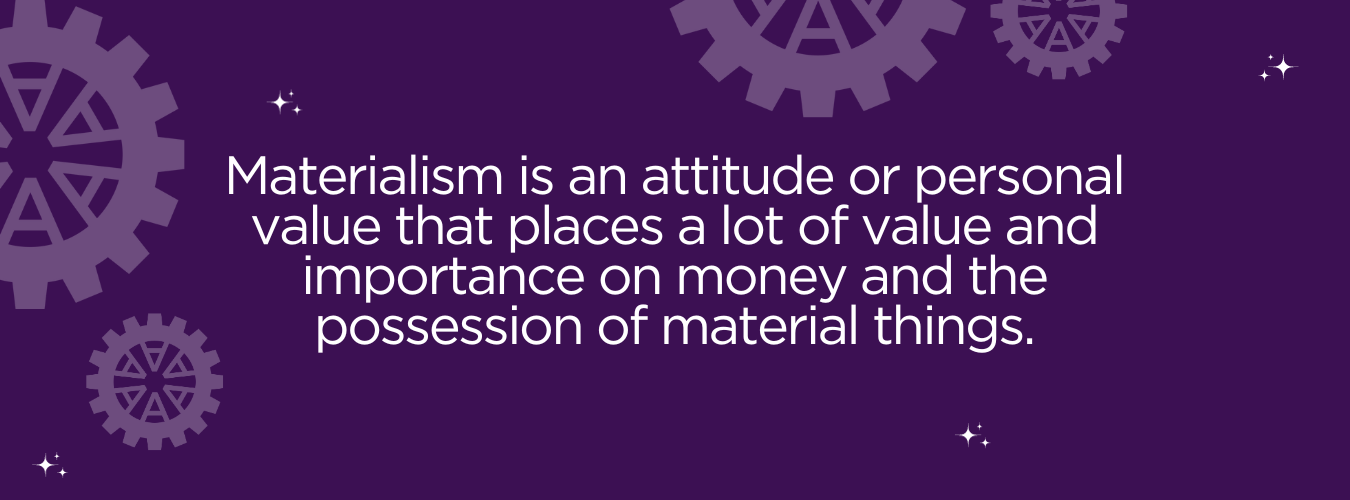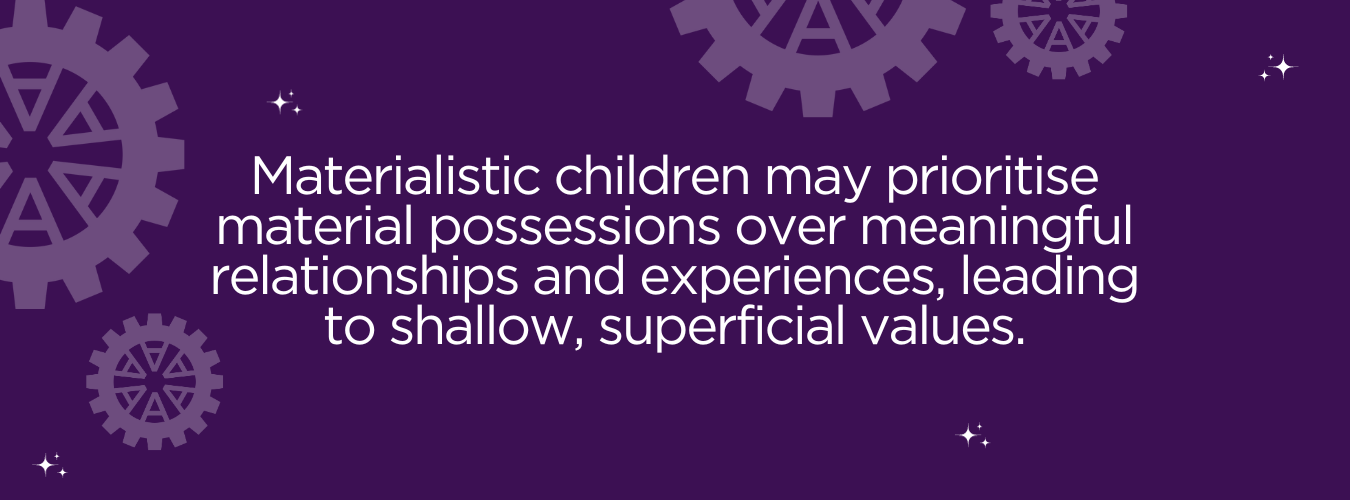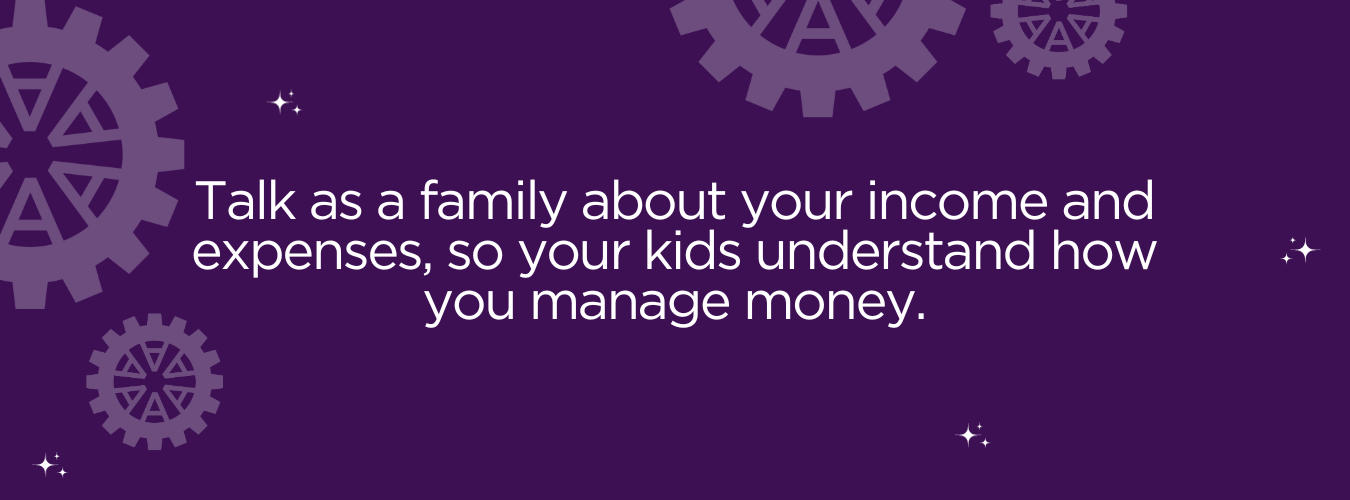Materialism in Children

In today's fast-paced and consumer-driven society, materialism has become a prevalent aspect of our lives. Children and family, too, are not immune to the influences of a materialistic culture and material world.
As parents, educators, and society at large, it is crucial to understand the implications and influence of materialism on children’s development and well-being.
Materialism in children can become a problem when it’s out of balance with other values. In children, it is often associated with low self-esteem and can lead other kids to a downward spiral of materialism, as they seek to feel better about themselves by owning more desirable things.
In this blog post, we will explore the concept of materialism in children, its causes, effects, and ways to curb materialism and foster essential values in young minds.
Is your child struggling to keep up with schoolwork? Are they falling behind? Are they bored in class? Or are you looking for extension work for your child? Check out our eBook to learn more about how we help your child improve academically and build confidence through our in-centre after-school tuition.
Understanding Materialism in Children
Materialism in children can be defined as the excessive desire for material goods and possessions and a preoccupation with consumer culture that increases materialism. This phenomenon often stems from various sources, from factors such as advertising, peer pressure, and parental influences.
In a world where the latest gadgets, fashion trends, and toys are constantly marketed to children, it is no wonder that they can develop a materialistic mindset by age five.
Materialism is an attitude or personal value that places a lot of value and importance on money and the possession of material things. How much stuff is ‘a lot’ is a matter of opinion and will vary between families and cultures, based on their beliefs and family values.

Why Do Some Children Become Materialistic?
Psychologists have found that materialism in children builds from the age of eight or around age nine, as one ages they become increasingly self-aware, compare themselves to others and may struggle with self-esteem.
In their late teens, most children become more comfortable with who they are their interest in materialism typically subsides.
If the world around a young child tends to portray money and possessions as life’s rewards and the keys to happiness, they’ll be more likely to pursue materialism to boost their self-esteem.
As with many learned behaviours, the strongest influences include the attitudes of their parents which influence their behaviours, the advertising messages they’re exposed to and the values of their friends, family and peers.
The Effects of Materialism on Children
- Superficial Values: Materialistic children may prioritise material possessions over meaningful relationships and experiences, leading to shallow, superficial values.
- Low Self-esteem: The constant desire for more possessions can create a cycle of low self-esteem, as children might tie their self-worth to the things they own.
- Reduced Empathy: Materialistic tendencies can inhibit the development of empathy and compassion, as the focus is primarily on one's desires rather than the needs of others.
- Environmental Impact: Materialism contributes to overconsumption, leading to environmental issues like pollution and resource depletion, which will significantly impact the future world of today's children.

How to Tell if Your Child Might be Overly Materialistic
Many parents who are concerned about keeping their child’s materialism in balance have come to recognise a few warning signs. These can include such materialistic attitudes and feelings towards material things as:
- Always expecting money or toys for completing routine tasks
- Throwing major hissy-fits when you won’t get them the latest must-have cool gadgets, which apparently ‘everyone else’s parents’ are buying for their kids
- An inability to give away or dispose of old toys they haven’t used for years
- Constantly saying they’re bored, have nothing to do or don’t have anything to play with, when the opposite is true
- Quickly losing interest in a new purchase they ‘couldn’t live without’ a week ago
How to Reduce a Child’s Materialism
A New York Times article reported on a study of 71 families with ‘high materialism score’ children. Half of the children in the study attended sessions for eight weeks that were designed to reduce their materialism. Compared to the other group, these children showed a marked decrease in their materialism score and an increase in self-esteem.
Recommendations for Parents with Materialistic Kids
- Give your children a regular allowance that’s split into three parcels; money for saving, spending and giving; and talk with them about the reasons behind their decisions
- Talk as a family about your income and expenses, so your kids understand how you manage money
- Help your children learn how to separate must-haves from nice-to-haves and to understand how and why you prioritise some things, such as having family holidays and experiences together rather than owning a flash car
- Talk about how advertising and peers can make people want things, and continue recognising examples together as they occur
- Encourage your children to identify and learn from someone they know who seems to be good at keeping a balance between wanting, spending and needing
- Make this something you continue to talk openly about as a family throughout their pre-teen and teenage years

Nurturing Essential Values in Children
- Promote Gratitude: Encourage children to appreciate what they have by practising gratitude. This can be done through daily discussions about the things they are thankful for, fostering contentment and reducing the constant desire for more.
- Encourage Experiences Over Possessions: Shift the focus from material gifts to memorable experiences. Engage in activities that promote learning, creativity, and bonding, emphasising the value of shared moments over material objects.
- Set a Positive Example: Children often model their behaviour after the adults in their lives. Demonstrate mindful consumption and emphasise the importance of non-materialistic values like kindness, generosity, and integrity.
- Limit Screen Time: Excessive exposure to advertisements and social media can fuel materialistic tendencies. Set boundaries on screen time to reduce the influence of consumer culture on children's minds.
- Teach Financial Literacy: Help children understand the value of money and the importance of saving and budgeting. Teaching them about responsible financial practices can instil a sense of responsibility and reduce impulsive spending.
- Encourage Philanthropy: Engage children in charitable activities and emphasise the joy of giving. Helping others in need fosters empathy and compassion, countering the self-centred aspects of materialism.
- Encourage Critical Thinking: Teach children to analyse advertisements and media messages critically. Help them understand the persuasive techniques used in marketing and advertising, empowering them to make informed decisions rather than succumbing to impulsive buying. Encouraging critical thinking equips children with the skills to resist the constant pressure to acquire more material possessions.
- Foster a Healthy Self-Image: Help children build self-confidence and a positive self-image based on their talents, skills, and qualities rather than material belongings. Encourage their interests and hobbies, emphasising personal growth and achievements beyond materialistic measures. By nurturing their talents and passions, children develop a strong sense of self-worth that is not dependent on external possessions, reducing the allure of materialism.

Other experts suggest you can reduce your child’s exposure to materialism and build their self-esteem by focusing on their emotional needs rather than their materialistic attitudes toward things, being careful not to reward them with materialistic kinds of things, not showing your child love through bought gifts, and not punishing them by taking away their materialistic attitudes of things, such as a video game or phone.
When it comes to your child’s allowance, it’s often recommended first to teach kids that at age two some of their spending money is expected to cover a few everyday necessities, such as bus and lunch money. As they get older, increase the allowance they spend more to include clothing, school stationery requirements, new toys, entertainment and so on.
Initially, you can pay them in cash, but later you could set your child up with an online bank account that’s linked to yours. That way you can pay them automatically online, keep an eye on their account, let them monitor their money online and give them an EFTPOS or debit card for independent spending.
Addressing materialism in our children's attitudes requires a collective effort from parents, educators, and society. By regarding children's materialism and promoting values and behaviours such as gratitude, empathy, and responsible consumption, we can help children navigate the challenges of a materialistic world while nurturing their character and overall well-being.
Through these efforts, we can empower and influence the next generation to embrace a more balanced and fulfilling approach to life, rooted in meaningful connections to family life and genuine contentment.
At NumberWorks’nWords, we understand the importance of nurturing not only academic success but also the overall well-being of your child. If you're looking to support your child's holistic development, book a free assessment or find a centre near you today. Our tailored programmes not only enhance your child's maths and English abilities but also instil crucial life skills, helping them succeed both inside and outside the classroom. Join us in shaping a brighter future for your child!




